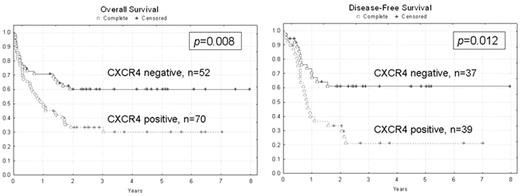Abstract
CXC chemokine receptor 4 (CXCR4) expression in acute myeloid leukemia (AML) is reported to correlate with FLT3 gene mutation and poorer prognosis. We analyzed the prognostic significance of CXCR4 expression in 122 AML patients with diploid karyotype and no evidence of FLT3 gene mutation treated at our institution between 1997 and 2003. All patients received intensive chemotherapy according to institutional protocols; 84% received cytarabine-containing regimens. Bone marrow biopsy specimens obtained at diagnosis from untreated patients were immunostained with an antibody specific for CXCR4 (Abcam, clone 2074; Cambridge, MA). Statistical analysis included the following variables: CXCR4 expression, age, sex, race, incorporation of cytarabine in the therapeutic regimen, presence of multilineage dysplasia, history of antecedent hematologic disorder, history of prior chemotherapy (for either hematological or non-hematological disorder), performance status, leukocytosis, hemoglobin, platelet count, bilirubin, and creatinine. There were 70 men and 52 women with a median age of 62 years (range, 22–82 years). Median follow-up was 18 months (range, <1–97 months). Seventy-six patients achieved complete remission (CR); 39 relapsed. Sixty-six patients died, including 9 with no evidence of disease. CXCR4 was positive in 70 and negative in 52 patients, with CR rates of 58% and 71%, respectively (p=0.09). In the univariate Cox model, CXCR4 expression was associated with shorter overall survival (OS), p=0.008, and disease-free survival (DFS), p=0.012, figure1.
Shorter OS was also associated with failure to achieve CR (p=<0.0001), age (p=0.01), presence of multilineage dysplasia (p=0.006), poorer performance status (p=0.049), higher creatinine level (p=0.00002), and lower hemoglobin level (p=0.042). Shorter DFS was associated with failure to achieve CR (p=0.0002), presence of multilineage dysplasia (p=0.02), history of prior chemotherapy (p=0.04), and higher creatinine level (p=0.0009).
In multivariate analysis, shorter OS was associated with CXCR4 expression (p=0.047), age (p=0.029), presence of multilineage dysplasia (p=0.042), and high creatinine level (p=0.016). Shorter DFS was associated with CXCR4 expression (p=0.036), history of prior chemotherapy (p=0.044), presence of multilineage dysplasia (p=0.007), and high creatinine level (p=0.034). These results suggest that CXCR4 expression is associated with poor prognosis in AML patients and is independent of FLT3 gene mutation.
Disclosure: No relevant conflicts of interest to declare.
Author notes
Corresponding author


